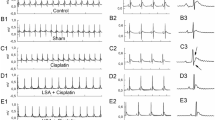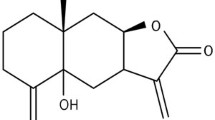Abstract
Cisplatin is a potent anti-cancer chemotherapeutic agent but has the undesirable side effect of hepatotoxicity at high doses. In a previous study, abrogation of cisplatin-induced hepatotoxicity by pretreatment with xanthorrhizol was observed in mice, but the mechanism has not yet been studied. We therefore investigated whether the protective effect of xanthorrhizol on cisplatin-induced hepatotoxicity is associated with the mitogen-activated protein (MAP) kinase-signaling pathway. Cisplatin caused phosphorylation of both c-Jun N-terminal kinases 1/2 (JNK1/2) and the extracellular signal-regulated kinase 1/2 (ERK1/2), but not that of p38. However, cisplatin-induced phosphorylation of JNKs, especially JNK1, was highly attenuated by pretreatment with xanthorrhizol in a dose-dependent manner. This study suggested that the phosphorylation of JNKs could be involved in the protective effect of xanthorrhizol on cisplatin-induced hepatotoxicity and it also affects gene transcription by regulating the expression of transcription factor subunits such as c-fos and p50 in part. In addition, considering that the expression of both cytochrome c and caspase-9 were not changed in this model, its mechanism might be independent of mitochondria-related apoptosis. This is the first report giving evidence that the physiological function of xanthorrhizol is linked to regulation of the phosphorylation of JNK(s).



Similar content being viewed by others
Abbreviations
- AP-1:
-
Activator protein 1
- COX-2:
-
Cyclooxygenase-2
- ERK:
-
Extracellular signal-regulated kinase
- JNK:
-
c-Jun N-terminal kinase
- MAP:
-
Mitogen-activated protein
- iNOS:
-
Inducible nitric oxide synthase
- NF-κB:
-
Nuclear factor-kappaB.
References
Cavalli F, Tschopp L, Sonntag RW, Zimmerman A (1978) A case of liver toxicity following cis-dichlorodiammineplatinum(II) treatment. Cancer Treat Rep 62:2125–2126
Cersosimo RJ (1993) Hepatotoxicity associated with cisplatin chemotherapy. Ann Pharm 27:438–441
Cui W, Yazlovitskaya EM, Mayo MS, Pelling JC, Persons DL (2000) Cisplatin-induced response of c-Jun N-terminal Kinase1 and Extracellular signal-regulated protein kinase 1 and 2 in a series of cisplatin-resistant ovarian carcinoma cell lines. Mol Carcinog 29:219–228
Donatus IA, Sardjoko L, Vermeulen NP (1990) Cytotoxic and cytoprotective activities of curcumin. Effects on paracetamol-induced cytotoxicity, lipid peroxidation and glutathione depletion in rat hepatocytes. Biochem Pharmacol 39:1869–1875
Kim SH, Hong KO, Chung WY, Hwang JK, Park KK (2004) Abrogation of cisplatin-induced hepatotoxicity in mice by xanthorrhizol is related to its effect on the regulation of gene transcription. Toxicol Appl Pharmacol 196:346–355
Kiso Y, Suzuki Y, Watanabe N, Oshima Y, Hikino H (1983) Antihepatotoxic principles of Curcuma longa rhizomes. Planta Med 49:185–187
Kobayashi K, Tsukamoto I (2001) Prolonged Jun N-terminal kinase (JNK) activation and the upregulation of p53 and p21(WAF1/CIP1) preceded apoptosis in hepatocytes after partial hepatectomy and cisplatin. Biochim Biophys Acta 1537:79–88
Lin SC, Lin CC, Lin YH, Supriyatna S, Teng CW (1995). Protective and therapeutic effects of Curcuma xanthorrhizol on hepatotoxin-induced liver damage. Am J Chin Med 23:243–254
Liu J, Liu Y, Habeebu SS, Klaassen CD (1998) Metallothionein (MT)-null mice are sensitive to cisplatin-induced hepatotoxicity. Toxicol Appl Pharmacol 149:24–31
Loehrer PJ, Einhorn LH (1984) Drugs five years later. Cisplatin. Ann Intern Med 100:704–713
Madias NE, Harrington JT (1978) Platinum nephrotoxicity. Am J Med 65:307–314
Minden A, Karin M (1997) Regulation and function of the JNK subgroup of MAP kinases. Biochim Biophys Acta 1333:F85–F104
Park EJ, Jeon CH, Ko G, Kim J, Sohn DH (2000) Protective effect of curcumin in rat liver injury induced by carbon tetrachloride. J Pharm Pharmacol 52:437–440
Persons DL, Yazlovitskaya EM, Cui W, Pelling JC (1999) Cisplatin-induced activation of mitogen-activated protein kinases in ovarian carcinoma cells: inhibition of extracellular signal-regulated kinase activity increases sensitivity to cisplatin. Clin Cancer Res 5:1007–1014
Pollera CF, Meglio F, Nardi M, Vitelli G, Morolla P (1987) Cisplatin-induced hepatic toxicity. J Clin Oncol 5:318–319
Potapova O, Haghighi A, Bost F, Liu C, Birrer MJ, Gjerset R, Mercola D (1997) The Jun kinase/stress-activated protein kinase pathway functions to regulate DNA repair and inhibition of the pathway sensitizes tumor cells to cisplatin. J Biol Chem 272:14041–14044
Sanchez-Perez I, Murguia JR, Perona R (1998) Cisplatin induces a persistent activation of JNK that is related to cell death. Oncogene 16:533–540
Sanchez-Perez I, Perona R (1999) Lack of c-Jun activity increases survival to cisplatin. FEBS Lett 453:151–158
Sanchez-Perez I, Martinez-Gomariz M, Williams D, Keyse SM, Perona R (2000) CL100/MKP1 modulates JNK activation, and apoptosis in response to cisplatin. Oncogene 19:5142–5152
Sanchez-Perez I, Benitah SA, Martinez-Gomariz M, Lacal JC, Perona R (2002) Cell stress and MEKK1-mediated c-Jun activation modulate NFκB activity and cell viability. Mol Biol Cell 13:2933–2945
Smeal T, Angel P, Meek J, Karin M (1989) Different requirements for formation of Jun: Jun and Jun: Fos complexes. Genes Dev 3:2091–2100
Song L, Ma X, Li Y, Cui X, Wang X (2003) Effects of nuclear translocation of tissue transglutaminase and the release of cytochrome C on hepatocyte apoptosis. Chin Med J 116:742–746
Treisman R (1996) Regulation of transcription by MAP kinase cascades. Cur Opin Cell Biol 8:205–215
Wang X, Martindale JL, Holbrook NJ (2000) Requirement of ERK activation in cisplatin-induced apoptosis. J Biol Chem 275:39435–39443
Acknowledgment
PKK work was supported by the Research Fund from Yonsei University College of Dentistry Research Fund of 1999.
Author information
Authors and Affiliations
Corresponding author
Rights and permissions
About this article
Cite this article
Hong, K.O., Hwang, J.K., Park, KK. et al. Phosphorylation of c-Jun N-terminal Kinases (JNKs) is involved in the preventive effect of xanthorrhizol on cisplatin-induced hepatotoxicity. Arch Toxicol 79, 231–236 (2005). https://doi.org/10.1007/s00204-004-0623-7
Received:
Accepted:
Published:
Issue Date:
DOI: https://doi.org/10.1007/s00204-004-0623-7




